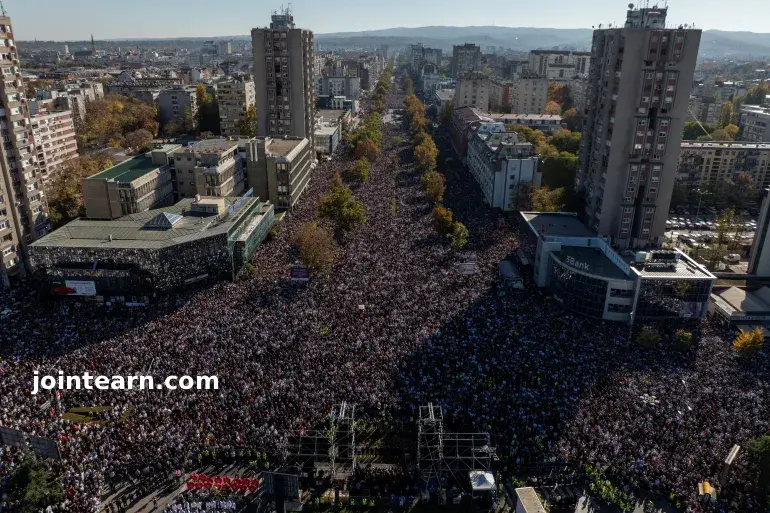
On Saturday, tens of thousands gathered in the Serbian city of Novi Sad to commemorate the first anniversary of the tragic train station roof collapse that killed 16 people and sparked a wave of mass anti-government protests. At precisely 11:52am local time—the exact moment the accident occurred on November 1, 2024—the crowd observed 16 minutes of silence, one for each lost life. An atmosphere of profound grief and defiance swept over the square as the public demanded justice for the victims and accountability from the government.
A Nation Mourns, Demands Action
For many in Serbia, the collapse of the newly renovated Novi Sad railway station has become an unsettling symbol of deep-rooted corruption, government negligence, and an unresponsive justice system. Over the past year, the tragedy has fueled rising anger across the country, especially among students and civil society activists.
Al Jazeera’s correspondent Milena Veselinovic described the atmosphere during the commemoration as “incredibly sombre,” emphasizing how the event served both as a memorial and a rallying cry for justice, transparency, and sweeping reform.
Unresolved Accountability and Legal Delays Fuel Protests
Though 13 individuals, including former construction minister Goran Vesic, have been criminally charged in connection with the collapse, Serbia’s legal system has yet to move the case forward. Critics point to a lack of political will and a judiciary heavily influenced by the ruling party as barriers to justice.
“A year on from this disaster, no one has been tried,” Veselinovic noted during her report.
Public distrust has only grown as a separate anti-corruption inquiry and an EU-backed investigation probe the alleged misuse of European funds designated for the reconstruction project. Activists and legal observers warn that without an independent judiciary, accountability may remain elusive.
Student-Led Protests Lead Nationwide Movement
Student groups have been instrumental in organizing protests and sustaining momentum. What began as a local movement in Novi Sad quickly evolved into a nationwide demand for systemic change. Calls for early elections and government accountability dominated the agenda as tens of thousands marched into Novi Sad from cities as far as Belgrade and Novi Pazar. Some demonstrators undertook a 16-day march spanning more than 100 kilometers to mark the occasion.
Residents of Novi Sad lined the streets, cheering and offering support to the arriving marchers—many waving Serbian flags or holding signs with messages of solidarity.
Heartbreak and Defiance: Voices from the Crowd
Among the mourners was Dijana Hrka, whose 27-year-old son was killed in the collapse. Standing with tears in her eyes, she expressed the pain still felt by families of the victims.
“What I want to know is who killed my child so I can have a little peace,” she said. “I want no other mother to go through what I am going through. I am looking for justice.”
Political Fallout and Government Response
The tragedy and ensuing protests triggered the resignation of Serbia’s prime minister, the collapse of his government, and the appointment of new leadership. However, President Aleksandar Vučić remains in office, defiantly dismissing accusations of wrongdoing and labeling demonstrators as “foreign-backed coup plotters.”
In a rare concession, Vučić issued a televised apology on Friday, saying,
“I apologise for saying things that I now regret … This applies both to students and to protesters.”
His remarks, however, have done little to quell criticism.
Corruption and Systemic Failures at the Forefront
Political analyst Aleksandar Popov told Al Jazeera that Serbia is struggling with “sky-high corruption” in public spending.
“We’re talking about billions of euros,” he said. “The government and president have captured all key institutions, including the judiciary.”
The European Union issued a statement urging restraint and calling for de-escalation of tensions ahead of the commemoration.
Saturday was declared a national day of mourning. Patriarch Porfirije of the Serbian Orthodox Church led a memorial mass in Belgrade, urging the nation to remain united in grief and resolve. Though most protests have remained peaceful over the past year, several demonstrations turned violent amid accusations of heavy-handed police tactics.
As candlelight vigils continue and white doves are released in a gesture of remembrance, many Serbians are left wondering when—not if—justice will prevail.


Leave a Reply